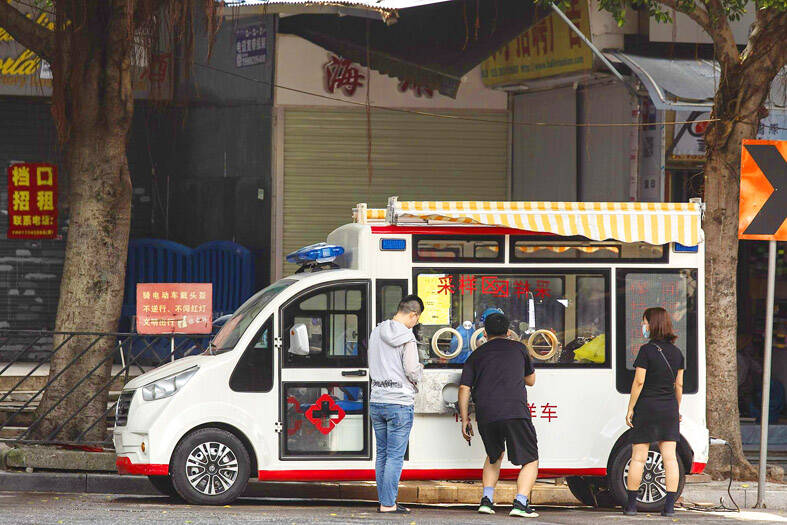New COVID-19 cases surged in Guangzhou and other Chinese cities, official data showed yesterday, with the global manufacturing hub becoming China’s latest COVID-19 epicenter and testing the city’s ability to avoid a Shanghai-style lockdown.
Nationwide, new locally transmitted infections rose to 7,475 on Monday, China’s health authority said, up from 5,496 the day before and the highest since May 1. Guangzhou accounted for nearly one-third of the new infections.
The increase was modest by global standards, but significant for China, where outbreaks are to be quickly tackled when they surface under its “zero COVID” policy. Economically vital cities, including Beijing, are demanding more polymerase chain reaction (PCR) tests for residents and locking down neighborhoods and even districts in some cases.

Photo: Bloomberg
The sharp rebound will test China’s ability to keep its virus measures surgical and targeted, and could dampen investors’ hopes that its economy could ease curbs and restrictions soon.
“We are seeing a game between rising voices for loosening controls and rapid spreading of COVID cases,” said Nie Wen, a Shanghai-based economist at Hwabao Trust.
Considering how the nationwide COVID-19 curbs are crushing domestic consumption, Nie said he had downgraded his fourth-quarter economic growth forecast to about 3.5 percent from 4 to 4.5 percent. The economy grew 3.9 percent in July-September.
The rising caseload dragged on China’s stock markets yesterday, but shares have not yet surrendered last week’s big gains.
Investors see China’s beaten-down markets as an attractive prospect as a global slowdown looms, and have focused on small clues of gradual change — such as more targeted lockdowns and progress on vaccination rates.
“No matter how harsh the letter of the law is ... there is a little bit more loosening,” said Damien Boey, chief macro strategist at Australian investment bank Barrenjoey.
Guangzhou, capital of Guangdong province, reported 2,377 new local cases for yesterday, up from 1,971 the previous day. It was a dramatic jump from double-digit increases two weeks ago.
Surging case numbers in the sprawling city, dubbed the “factory floor of the world,” means Guangzhou has surpassed the Inner Mongolia city of Hohhot to become China’s COVID-19 epicenter, in its most serious outbreak ever.
Many of Guangzhou’s districts, including Haizhu, have imposed varying levels of curbs and lockdowns, but it has not imposed a blanket lockdown like the one in Shanghai earlier this year.
Shanghai, currently not facing a virus resurgence, went into a lockdown in April and May after reporting several thousand new infections daily in the last week of March.
“We have been working from home for the past couple of days,” said Aaron Xu, who runs a company in Guangzhou. “Only a few compounds have been locked up so far. Mostly we are seeing disruptions in the form of public transit services being suspended and compound security barring couriers and food delivery. And we have to do PCR tests every day.”

ANGER: A video shared online showed residents in a neighborhood confronting the national security minister, attempting to drag her toward floodwaters Argentina’s port city of Bahia Blanca has been “destroyed” after being pummeled by a year’s worth of rain in a matter of hours, killing 13 and driving hundreds from their homes, authorities said on Saturday. Two young girls — reportedly aged four and one — were missing after possibly being swept away by floodwaters in the wake of Friday’s storm. The deluge left hospital rooms underwater, turned neighborhoods into islands and cut electricity to swaths of the city. Argentine Minister of National Security Patricia Bullrich said Bahia Blanca was “destroyed.” The death toll rose to 13 on Saturday, up from 10 on Friday, authorities

Two daughters of an Argentine mountaineer who died on an icy peak 40 years ago have retrieved his backpack from the spot — finding camera film inside that allowed them a glimpse of some of his final experiences. Guillermo Vieiro was 44 when he died in 1985 — as did his climbing partner — while descending Argentina’s Tupungato lava dome, one of the highest peaks in the Americas. Last year, his backpack was spotted on a slope by mountaineer Gabriela Cavallaro, who examined it and contacted Vieiro’s daughters Guadalupe, 40, and Azul, 44. Last month, the three set out with four other guides

Local officials from Russia’s ruling party have caused controversy by presenting mothers of soldiers killed in Ukraine with gifts of meat grinders, an appliance widely used to describe Russia’s brutal tactics on the front line. The United Russia party in the northern Murmansk region posted photographs on social media showing officials smiling as they visited bereaved mothers with gifts of flowers and boxed meat grinders for International Women’s Day on Saturday, which is widely celebrated in Russia. The post included a message thanking the “dear moms” for their “strength of spirit and the love you put into bringing up your sons.” It

DISASTROUS VISIT: The talks in Saudi Arabia come after an altercation at the White House that led to the Ukrainian president leaving without signing a minerals deal Ukrainian President Volodymyr Zelenskiy was due to arrive in Saudi Arabia yesterday, a day ahead of crucial talks between Ukrainian and US officials on ending the war with Russia. Highly anticipated negotiations today on resolving the three-year conflict would see US and Ukrainian officials meet for the first time since Zelenskiy’s disastrous White House visit last month. Zelenskiy yesterday said that he would meet Saudi Arabian Crown Prince Mohammed bin Salman, the nation’s de facto leader, after which his team “will stay for a meeting on Tuesday with the American team.” At the talks in the Red Sea port city of Jeddah, US